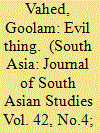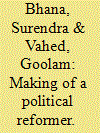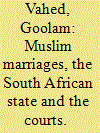|
|
|
Sort Order |
|
|
|
Items / Page
|
|
|
|
|
|
|
| Srl | Item |
| 1 |
ID:
168807


|
|
|
|
|
| Summary/Abstract |
Between 1860 and 1911, 152,184 Indian indentured workers went to the then British colony of Natal to work primarily on the sugar plantations. They were followed by free Indian migrants. White settlers felt threatened by a settled Indian population and passed legislation to curb their immigration, trading, employment and residence rights. The struggle of Indians against this racist legislation was spearheaded by Mohandas Karamchand Gandhi. The most contentious issues surrounding Gandhi’s South African stay between 1893 and 1914 are his allegedly racist attitudes towards Africans and his neglect of indentured migrants and their descendants. This article examines Gandhi’s attitude to, and relationship with, the indentured. While most academic studies have argued that Gandhi was oblivious to them until 1913, this article presents a nuanced picture, drawing on aspects of historical archives that have not yet been fully drawn upon, or re-reading those that have been consulted previously. It shows that Gandhi’s views underwent an observable transformation during the time that he was in South Africa, to the point that he came to describe the system of indenture as ‘an evil thing’. However, his reasons for wanting an end to the system were multiple and complex, relating not just to the plight of the indentured, but also the utility of ending indenture for non-indentured Indians.
|
|
|
|
|
|
|
|
|
|
|
|
|
|
|
|
| 2 |
ID:
063283


|
|
|
|
|
| Publication |
New Delhi, Manohar, 2005.
|
| Description |
181p.
|
| Standard Number |
8173046123
|
|
|
|
|
|
|
|
|
|
|
|
Copies: C:1/I:0,R:0,Q:0
Circulation
| Accession# | Call# | Current Location | Status | Policy | Location |
| 049794 | 322.44/BHA 049794 | Main | On Shelf | General | |
|
|
|
|
| 3 |
ID:
185580


|
|
|
|
|
| Summary/Abstract |
A central feature of South Africa's legal system under white minority rule was the state's institutionalisation of racist structures and a distinct Christian bias in religious matters. Muslim marriages were not recognised because they permitted polygamy. Majority rule in 1994 resulted in the adoption of a new constitution that recognised non-Christian and ‘non-European' beliefs and practices, and some Muslims lobbied for the legal recognition of Muslim marriages. While the new political context was sympathetic to accommodating multicultural practices, legislation stalled because of differences among Muslims over what constitutes Muslim Personal Law (MPL). This article focuses on debates in South Africa on state governance of Muslim family law and how, in the void created by the absence of legislation, the country’s courts have seized the initiative through ex-post facto recognition of the consequences of Muslim marriages. South Africa thus represents a peculiar case of the courts recognising the consequences of Islamic marriages, even while Parliament has failed to write this into law. As such, South Africa provides a stark contrast to many other countries where there is acrimonious debate over legal pluralism and, in particular, accommodating MPL.
|
|
|
|
|
|
|
|
|
|
|
|
|
|
|
|
|
|
|
|
|